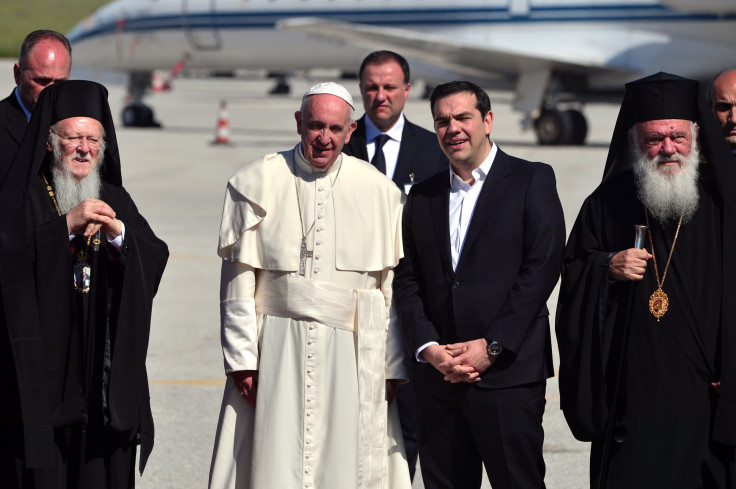Pope Francis Calls For ‘Common Humanity’ Toward Refugees During Greece Visit

Pope Francis visited Greece Saturday to thank the country’s people for welcoming refugees, despite the European Union’s controversial plan to deport them to Turkey, the Associated Press reported Saturday. During his visit, the pope assured refugees in the Greek island that they are not alone, and the pontiff was scheduled to observe a minute’s silence at the Moria camp to honor those who died while crossing the dangerous waters.
The Vatican is currently hosting two refugee families and the AP report cited a Greek state-run news network to say that the pope may take back up to 10 refugees with him after the five hour trip. The gesture would be along the lines of Pope Francis’ calls to open Europe’s borders to refugees, AP reported. The visit was reportedly to show a united Christian response to the humanitarian crisis in Europe, where thousands of refugees, mostly from Syria, are seeking asylum.
"This is a voyage marked by sadness... We will witness the worst humanitarian disaster since the Second World War,” Pope Francis told reporters during the journey to Greece, according to the BBC, adding: “We will see so many people who are suffering, who are fleeing and do not know where to go. And we are also going to a cemetery, the sea. So many people never arrived.”
The BBC report also said that the pope acknowledged the “great sacrifice” made by the people in the Moria camp and said that he wanted to “draw the attention of the world to this grave humanitarian crisis.” He also called on the world to show “common humanity” in dealing with the refugee crisis and told the residents at the camp not to lose hope. “The greatest gift we can offer to one another is love,” the pope said.
The pope was greeted at the Lesbos Mytilene airport by Greek Prime Minister Alexis Tsipras, Patriarch Bartholomew, the spiritual head of the world's Orthodox Christians, and Archbishop of Athens leronimos II. Tsipras said, according to AP, that he was proud of his country’s response to the humanitarian crisis “at a time when some of our partners — even in the name of Christian Europe — were erecting walls and fences to prevent defenseless people from seeking a better life.”
The report of the pope taking back refugees with him was not confirmed by Vatican authorities. Vatican spokesman the Rev. Federico Lombardi declined to comment on the report, and said, according to AP: “I have nothing to say at this time.”
Just hours before the pope arrived at the Greek island, authorities intercepted a dinghy that was carrying 41 Syrian and Iraqi nationals off the coast of Lesbos. The detained refugees were brought onshore in the main part of Mytilene.
Refugees are not numbers, they are people who have faces, names, stories, and need to be treated as such.
— Pope Francis (@Pontifex) April 16, 2016
A deal between the European Union and Turkey stipulates that any person who arrives secretively to Greek islands on or after March 20 will be returned to Turkey unless they apply for asylum in Greece. The deal also states that for every Syrian sent back, the EU will take another Syrian from Turkey to be resettled in the region. In exchange Turkey was also given concessions, including billions of euros to tackle the crisis of over 2.7 million Syrian refuges living there. The country was also promised a speedy accession talks with the EU.
The Vatican official in charge of migrants, Cardinal Antonio Maria Veglio, had stated that the EU-Turkey deal treats refugees as merchandise and does not recognize their inherent dignity as humans. However, the Vatican insists that the pope’s visit Saturday was purely humanitarian and religious in nature and was not a political or a “direct” criticism of the EU deal.
© Copyright IBTimes 2025. All rights reserved.






















